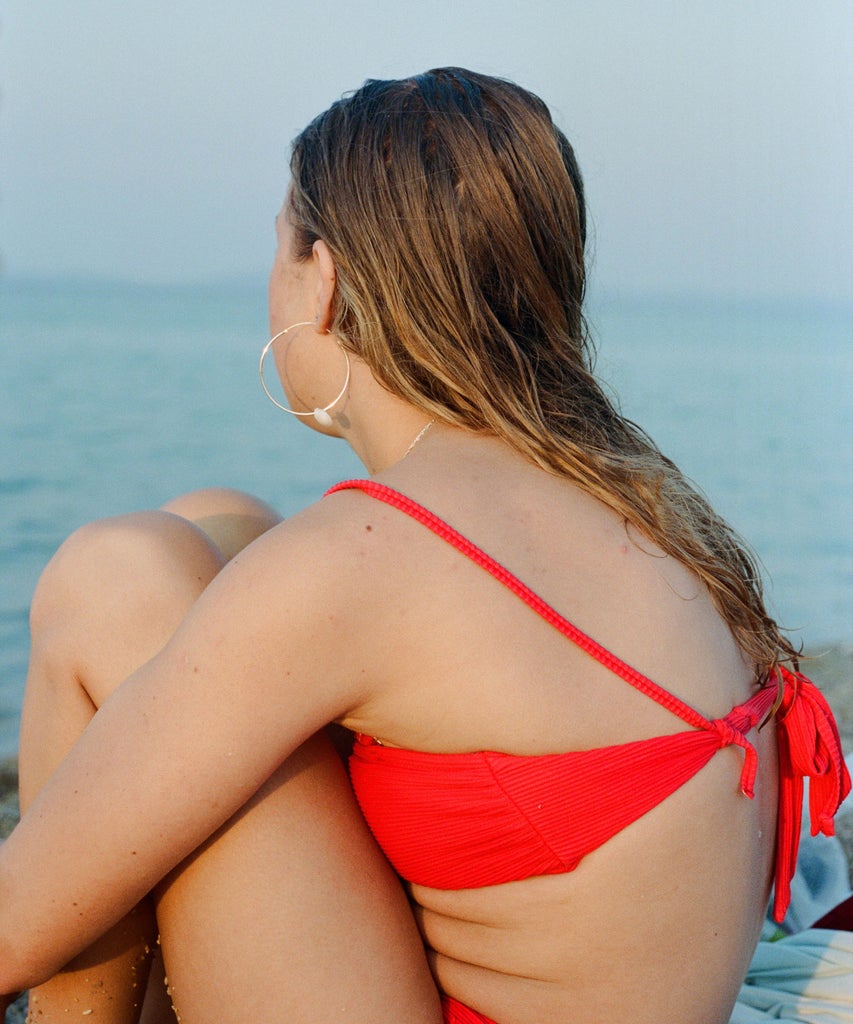
Along with frizz and mosquito bites, body acne is a headache that hits hardest in the summer. When you have rash-like pimples sprouting on the back of your neck or shoulders, you want a speedy fix — preferably before you put on a swimsuit. So, you ask a friend for advice, and she floats a DIY treatment plan that sounds something like: “Just lay out in the sun; it’ll dry right up.“
If the suggestion sounds a little suspect, that’s because it is. While laying out sans sunscreen might deflate some pustules and shrivel them into scars (seemingly the lesser of two evils), it will also stimulate perspiration, causing oils to rise to the surface of the skin — which, instead of solving your problem, actually makes it worse.
As board-certified dermatologist Caroline Robinson, MD, explains, the myth of a sunburn as the cure-all for body acne exists because most people don’t consider the full scope of what’s happening beneath the surface of the skin. “Sometimes after sun exposure, surface acne does look less inflamed, even clearer, because the skin dries out and temporarily produces less sebum,” Dr. Robinson says. “But that acne and inflammation still exists under the surface of the skin, and exposing it to the sun without protection can lead to much bigger long-term problems, including a higher risk of scarring, hyperpigmentation, and more persistent breakouts — not to mention skin cancers.”
So, how can you do both, and clear up your acne without putting your skin health at risk? Opt for safe topical treatments (i.e. not the sun). Dr. Robinson says an OTC medication containing benzoyl peroxide could help if you’re dealing with red, angry bumps, or a topical with salicylic acid if the nature of your acne is more whiteheads and blackheads. Even simpler, consider adding a gentle exfoliating body wash to your shower routine. “Any clarifying cleanser that contains hydroxy acids could be helpful in treating pesky body acne,” dermatologist Joshua Zeichner, MD, explains. “It will help remove excess oil and dead cells from the surface of the skin without drying it out.”
The second part of the equation requires choosing the right sunscreen, which is especially important if you’ve implemented any of the aforementioned treatments that could put your skin at greater risk of burning. For acne-prone skin, most derms will recommend an oil-free and non-comedogenic formula. “Two things can cause sunscreen-related breakouts: occlusion of the pores, and a sensitivity reaction to the UV-blocking ingredients,” dermatologist Hadley King, MD, says. “Your best bet is to look for ‘non-comedogenic’ on the label and avoid all potential irritants like emollients, fragrances, and preservatives.”
To that end, Dr. Robinson’s recommendation is a broad-spectrum, fragrance-free, water-resistant SPF 50 by Coola. Dr. King loves the cult-favourite Isdin formula, as well as brush-on powders, which are easy to swipe over your shoulders and chest without having to worry about leaving white residue on your bikini strings or coverup.
Refinery29’s selection is purely editorial and independently chosen – we only feature items we love! As part of our business model we do work with affiliates; if you directly purchase something from a link on this article, we may earn a small amount of commission. Transparency is important to us at Refinery29, if you have any questions please reach out to us.
Like what you see? How about some more R29 goodness, right here?
Black Women Share Their Favorite Sunscreens